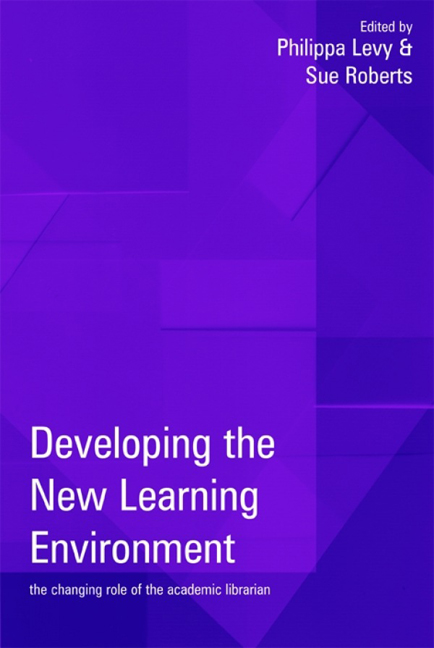Book contents
- Frontmatter
- Contents
- The editors and contributors
- Introduction: the challenge for the academic librarian
- Part 1 Perspectives on the policy framework
- 1 The policy framework: a critical review
- 2 Pedagogy in a changing environment
- 3 Literacies and learning
- 4 Key issues in the design and delivery of technology-enhanced learning
- 5 New professional identities and practices for learner support
- Part 2 Policy into practice
- Part 3 Reflections
- Index
3 - Literacies and learning
from Part 1 - Perspectives on the policy framework
Published online by Cambridge University Press: 08 June 2018
- Frontmatter
- Contents
- The editors and contributors
- Introduction: the challenge for the academic librarian
- Part 1 Perspectives on the policy framework
- 1 The policy framework: a critical review
- 2 Pedagogy in a changing environment
- 3 Literacies and learning
- 4 Key issues in the design and delivery of technology-enhanced learning
- 5 New professional identities and practices for learner support
- Part 2 Policy into practice
- Part 3 Reflections
- Index
Summary
In this chapter, Dorothy Williams explores important new understandings and ideas about information literacy and other literacies of relevance to learning in higher education. Arguing that the information process and the learning process are closely intertwined, she identifies information literacy as a meta-competency that in the networked environment encompasses other literacies such as media literacy, digital literacy and e-literacy. She notes the increasing emphasis, in emerging definitions of information literacy, not only on information sources and searching but also on higher-order capabilities relating to information use in knowledge creation and sharing, and she suggests that there are implications here for the design of information literacy programmes. At the same time she suggests a need to develop new pedagogical approaches – in particular, approaches that engage closely with learners’ personal experiences and conceptions of information seeking and use in specific contexts, and encourage critical reflection on differing approaches and perspectives. This in turn suggests a redefinition of the librarian's role as information literacy educator, with a shift away from direct instruction towards a key role in facilitating the dialogical interactions between learner and tutor, and among learners, that are at the heart of constructivist and relational conceptions of learning and teaching.
Introduction
The ability to find, critically evaluate and use information meaningfully in response to need has long been recognized as central to learning and decision-making. The library and information profession has consistently argued for its significance in relation to a wide range of learning theories and educational concepts in the English-speaking world over many years – independent learning, resource-based learning, problem-based learning and critical thinking, to name but a few. It is argued that schools, colleges and universities need to ensure learners develop confidence in information handling to equip them to make decisions and cope with change throughout life, as active critical citizens, life-long learners and evidence-based practitioners.
By the last decade of the 20th century the term ‘information literacy’, initially coined in the 1970s (Carbo, 1997), had become widely used in the library and information profession to denote the ability to search for, evaluate and use information. Yet it could be said that there have been as many attempts to define the precise nature of information literacy as there have been learning theories.
- Type
- Chapter
- Information
- Developing the New Learning EnvironmentThe changing role of the academic librarian, pp. 49 - 69Publisher: FacetPrint publication year: 2005
- 3
- Cited by



